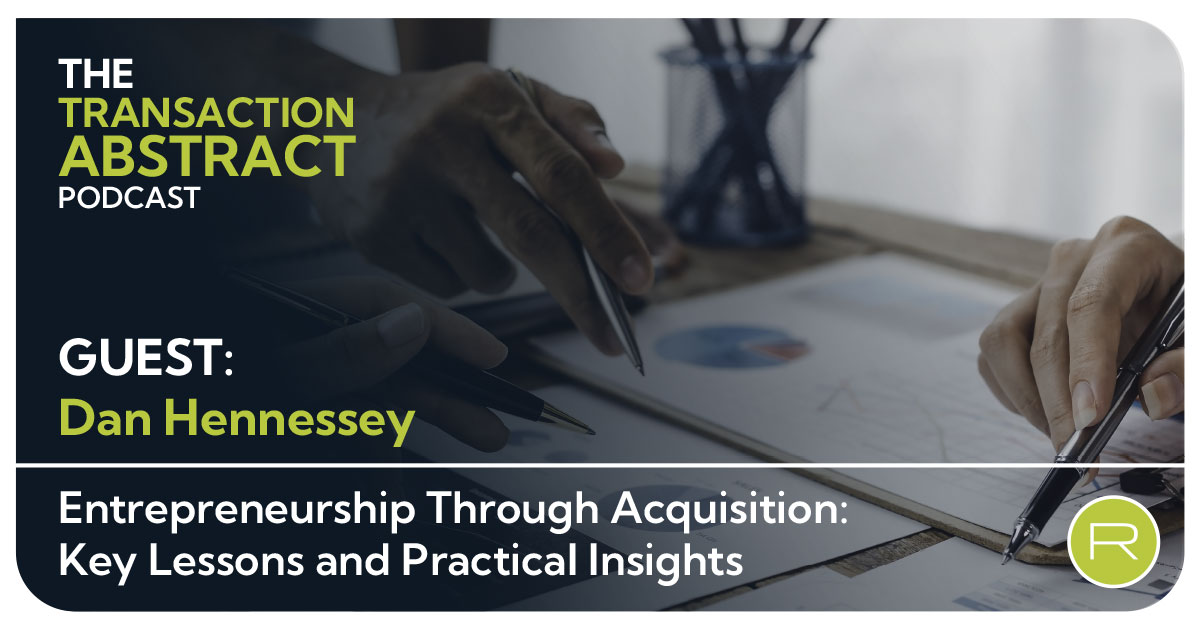Entrepreneurship Through Acquisition: Key Lessons From Dan Hennessey
In this episode of The Transaction Abstract Podcast, Joe Hellman sits down with Dan Hennessey, the newly appointed CEO of Sam Schwartz Pedestrian...
2 min read
 Redpath and Company
:
Aug 18, 2022
Redpath and Company
:
Aug 18, 2022
![Understanding Family Offices as an Option for Your Business [PODCAST]](https://www.redpathcpas.com/hubfs/Family%20Offices%208.18.22-1.jpg)
For family and founder-owned businesses, selling the company or taking on an investment partner is more than a strategic and financial transaction, it is personal. Many do not realize the breadth of options available, including family offices who may provide a more personalized flexible approach to change.
Joe Hellman recently talked with Emma Gergen of Carlson Private Capital for an episode of The Transaction Abstract podcast, to learn more about how family offices differ from traditional private equity partners. With a background in accounting and finance, Emma combines her private equity experience with first-hand knowledge that comes from growing up in a family business.
Listen to this episode to hear Emma’s unique perspective on what sets family office apart and how those distinctions may benefit a family business considering a sale.
A traditional private equity firm raises money from third-party limited partners. They invest in and manage business acquisitions with a goal of generating a profit, typically over 3-5 years, before selling that asset. Their fiduciary responsibility is to their investors.
A single family office takes on just one limited partner — the family. In this case the primary responsibility is still to generate a return but in a way that serves the family, whose goals extend beyond returns. In many ways, a family office ownership mindset is an extension of the founder and family business ownership. The relationship can be longer-term and focused more broadly on transitioning the business, with a focus on business success, its employees and communities.
“There is a saying about if you’ve met one family office, you’ve met one family office,” laughs Emma. In other words, every situation has unique nuances.
Different family offices have varying growth strategies that dictate how they operate as partners. However, the family’s specific situation also comes into play—how they have generated their wealth, how they think about what they want to do with their capital, and how involved they want to be moving forward.
Carlson Private Capital, for example, is strictly focused on direct investing. Their team comes from traditional private equity backgrounds, but their approach blends that experience with a flexible family capital mindset. They use what they describe as a “pull model” whereby they allow the business to pull them into opportunities where it makes sense and they can be helpful.
“Similar to a private equity firm, we have a breadth of experience and network of resources that can help companies through the course of their growth,” explains Emma. The family office serves as a thought partner to bounce ideas and collaborate with management, and they bring a fresh perspective about growth and opportunity. It is up to the management team to pull them in at times when they know the CPC team can help.
Some family offices may participate in processes through investment banks. In Carlson’s case, they often find that opportunity starts with a prior relationship they have had with the investment banker, founder or family themselves. Because CPC prefers to invest alongside rollover from management or families, relationships on the front end help them get a good sense of cultural fit and alignment prior to engaging in a process.
They may invest using primary or secondary capital, depending on the needs of the business and the ownership group. On the primary side, the family office provides capital as a source of liquidity or partial liquidity for an owner who wants to exchange some portion of ownership and equity for cash, at an agreed-upon valuation. On the secondary side, capital is added to the balance sheet to support strategic initiatives. The business may receive incremental capital over time in addition to initial liquidity.
Emma describes her firm’s family office model as “the third option” because in contrast to selling to a strategic acquirer or traditional private equity, CPC combines the capabilities of private equity with longer term stewardship, flexibility, and a legacy mentality of a family.
Emma says that mentality is not only a winning strategy, it is a lot more fun.

In this episode of The Transaction Abstract Podcast, Joe Hellman sits down with Dan Hennessey, the newly appointed CEO of Sam Schwartz Pedestrian...
![Common Legal Pitfalls in M&A Transactions with Kim Lowe [PODCAST]](https://www.redpathcpas.com/hubfs/Podcast-Legal-Pitfalls-Kim-Lowe.jpg)
In this episode of The Transaction Abstract Podcast, Joe Hellman sits down with Kim Lowe, Partner at Avisen Legal, to discuss the most common legal...
![Legal Considerations in Self-Funded Search Fund Transactions with Jake Parsley [PODCAST]](https://www.redpathcpas.com/hubfs/Blog%20Images/%5BTEMPLATE%5D%20RED%20Podcast-%2012-122024%20(1).png)
In this episode of The Transaction Abstract Podcast, Joe Hellman speaks with Jake Parsley, a partner at SMB Law Group specializing in search fund...